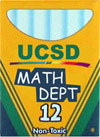 Getting Started >
Dealing with Exams >
Returning Exams
Getting Started >
Dealing with Exams >
Returning Exams
I always found returning exams to be very stressful: there's a lot to do in a little time (including dealing with regrade requests), students are agitated, and the situation can get hectic. In particular, you need to worry about cheating once again. Having a system helps. Your professor may already have a preferred system, but if s/he doesn't I recommend the following:
- When the minute hand reaches 12, tell your students the class average and any grading curve information you have (it's likely you will have no curve information, in which case you should tell them that). If the professor has not already presented the exam solutions, you probably should. While doing this, I like to emphasize common mistakes. Also, if you or another TA had a potentially confusing or controversial grading scheme for one of the problems, you should explain that here, too (this will cut down on the number of regrade requests you get later). You may also want to advise students to take notes so thay can compare your solutions to their own.
- After the presentation, tell students that you will be handing back the exams, but that once an exam leaves the room, there is no longer the possibility of a regrade for that exam. In other words, if they want to request a regrade, they should give the exam to you before they depart.
- Hand back the exams (by calling out names, not by passing around the stack). Then give the students 5 or 10 minutes to look over their marked exams, during which time they should come up to you with specific questions. After this time, if a student wants a regrade, s/he should write a note on a separate sheet of paper explaining his/her case for more points, and then hand back to you the exam and explanatory sheet. Alternatively, you could tell the student to come discuss it with you during office hours. Remember, in most circumstances, the TA who graded the contested problem should have the final decision about the regrade.
- Use the remaining time to talk about homework, etc.
Regrades beget more regrades. If you're a big softie on the first quiz or midterm, students will learn, and will harass you even more the next time. Taking a hard line early helps to prevent this cycle.
United we stand. You may very well disagree with how your professor writes exams, or how your fellow TA graded #4. But it's nevertheless important to act as a professional team with your colleagues, and back them up if necessary. Expressing frustration about the prof or other TAs in front of your students not only reflects badly on everone, it also gives students the idea that they can "divide and conquer" to get a better grade, which we obviously want to avoid.
